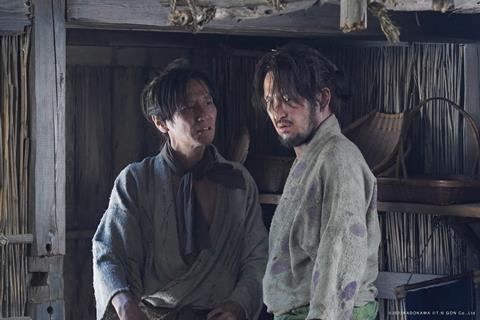Takeshi Kitano’s return to the samurai genre is an adaptation of his own historical novel

Dir/scr: Takeshi Kitano. Japan. 2023. 131mins.
Heads certainly roll in ‘Beat’ Takeshi’s return to the samurai genre 20 years on from the gloriously zany Zatoichi. In fact, by the end of what the veteran director has declared may be his last film, there’s a huge pile of them waiting to be processed to confirm that the chief enemy warlord really was killed in the final battle. That’s a classic, old-school Kitano comic touch – funny, dark, and just a little childish, in a good way. It’s just a shame there aren’t more such moments in this chaotic period actioner based on a famous historical act of betrayal in Sengoku-era Japan.
Kubi seems to want to be a rousing samurai movie while simultaneously undermining the whole genre
In 2019, Kitano published a highly embroidered novel, also called ’Kubi’ (which means ‘neck’, the landing spot of many a samurai sword), based on the 1582 Honno-ji incident, when a regional Kyoto warlord who was attempting to extend his powerbase across the whole of Japan died during a coup led by one of his lieutenants. Adapting your own material can be risky and it certainly feels that way here, as if Kitano was so invested in the research he put into the book that he couldn’t bear to chop the narrative heads off any of the bewildering number of rival shogun warlords, deputies and bit players that the film throws at us.
Picked up for domestic distribution and international sales by Japanese studio Kadokawa a month prior to its debut in the Cannes’ Premiere sidebar, Kubi should be reasonably well received at home. But, outside of fan circles and Asian genre niches, it’s unlikely to enjoy anything like the international arthouse success of Zatoichi.
The action begins in the autumn of 1579, a little under three years before warlord Oda Nobunaga’s meteoric bid to unify all of mainland Japan was brought to an abrupt end. Entertainingly manic, Ryo Kase plays Nobunaga as a spoilt hothead with a sadistic streak (not far from the historical record, it seems). On-screen captions identify the other key players – each of them retainers of Nobunaga with their own power bases and agendas.
Kitano himself plays the wily Toyotomi Hideyoshi (a.k.a. Monkey), an illiterate former peasant, who is gradually seen to be the puppet master in chief, fomenting a plot to overthrow Nobunaga for his own ends. The plotters who fall unwittingly into Hideyoshi’s web are Akechi Mitsuhide (Hidetoshi Nishijima, riding high after his star turn in Drive My Car), up to this point one of Nobunaga’s most loyal vassals, and Araki Murashige (Kenichi Endo) who is first seen launching a rebellion against his overlord.
Mitsuhide and Murashige are lovers – something, the film suggests, that was common in this exclusively male feudal society. The problem is that while Kitano references the well-documented tradition of ‘beloved retainers’ – samurais who entered into brotherhood contracts that were very much like marriages – he seems more interested in exploiting it for shocks or laughs than in embedding it in the culture of the times. An Afro-Japanese vassal of Nobunaga is deployed in a similarly superficial way to comically expose racist attitudes in Japan; it would have been nice if he had been allowed to become a character too.
Further zany distraction is provided by Mosuke (Shido Nakamura, hamming it up for all he’s worth), a dim but weirdly sword- and arrow-proof peasant farmer with dreams of becoming a samurai. Mosuke is taken on as a kind of lucky charm personal assistant by former ninja Shinzaemon (Yuichi Kimura), who runs espionage and murder errands for Hideyoshi.
A handful of bone-crunching, arrow-whirring, neck-slicing battle scenes allow us some time off from trying to follow the convoluted narrative thread. Sumptuously staged, apparently with hundreds of extras rather than VFX compositors – or at the very least, a bit of both – these are bracingly enjoyable while they last. Taking satirical aim at solemn Japanese feudal traditions like seppuku or hara-kiri (ritual disembowelment), Kubi seems to want to be a rousing samurai movie while simultaneously undermining the whole genre. Alas, Akira Kurosawa’s Yojimbo still remains one of the few films ever to have pulled that act off successfully.
Production companies: Asmik Ace Entertainment, Toho Company
International sales: Kadokawa Corporation, Chiyo Mori, mori-c@kadokawa.jp
Producers: Takeshi Natsuno, Daiji Horiuchi, Daisuke Futagi
Screenplay: Kitano Takeshi, based on the novel ’Kubi’ written by Kitano Takeshi
Production design: Yukiharu Seshimo
Editing: Yoshinori Ota
Cinematography: Takeshi Hamada
Music: Taro Iwashiro
Cast: Takeshi Kitano, Hidetoshi Nishijima, Ryo Kase, Kaoru Kobayashi, Shido Nakamura, Tadanobu Asano, Nao Omori, Kenichi Endo, Masanobu Katsumura, Yuichi Kimura
























